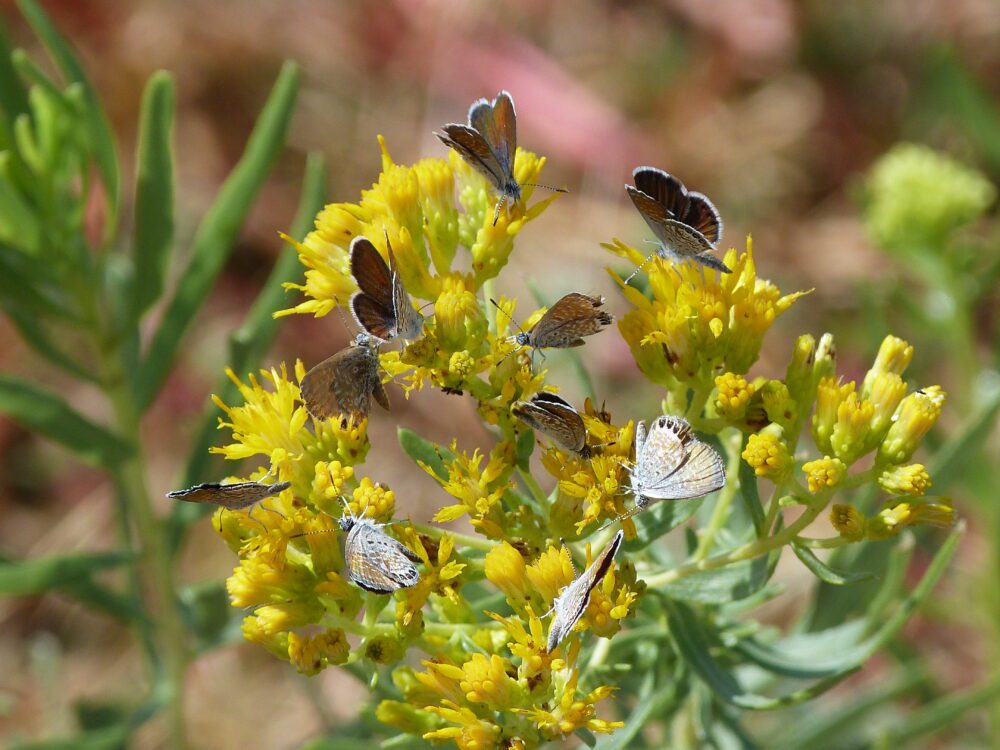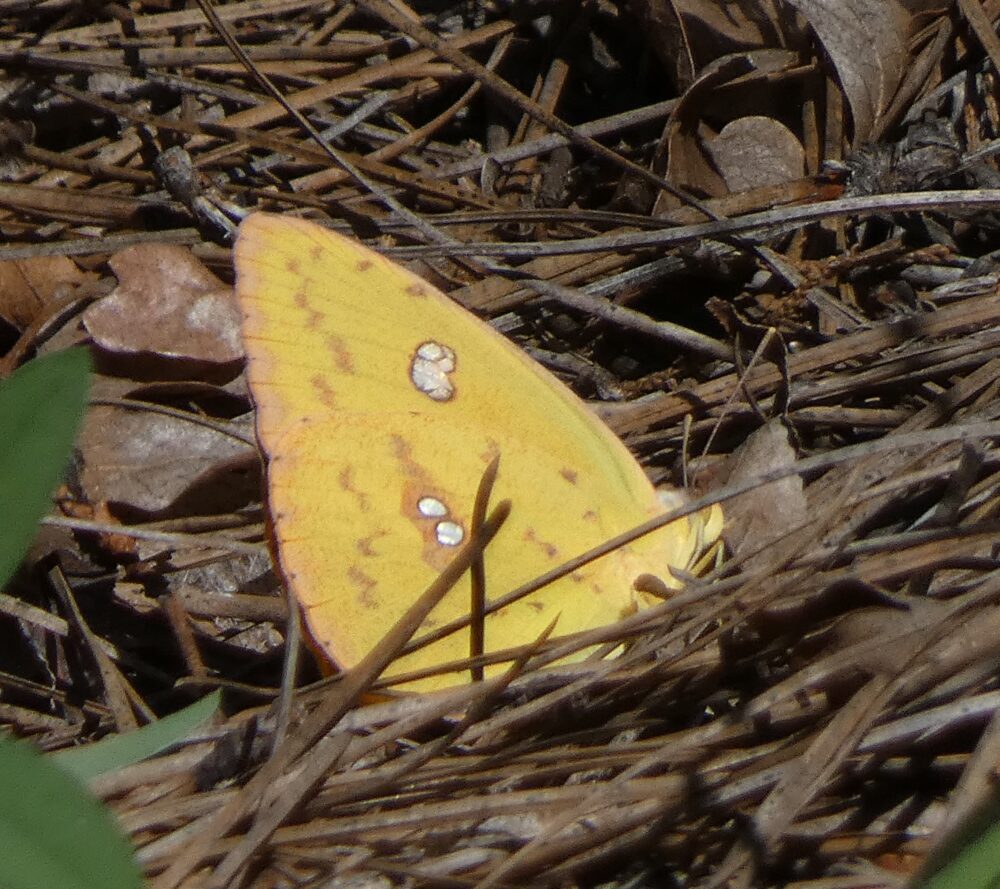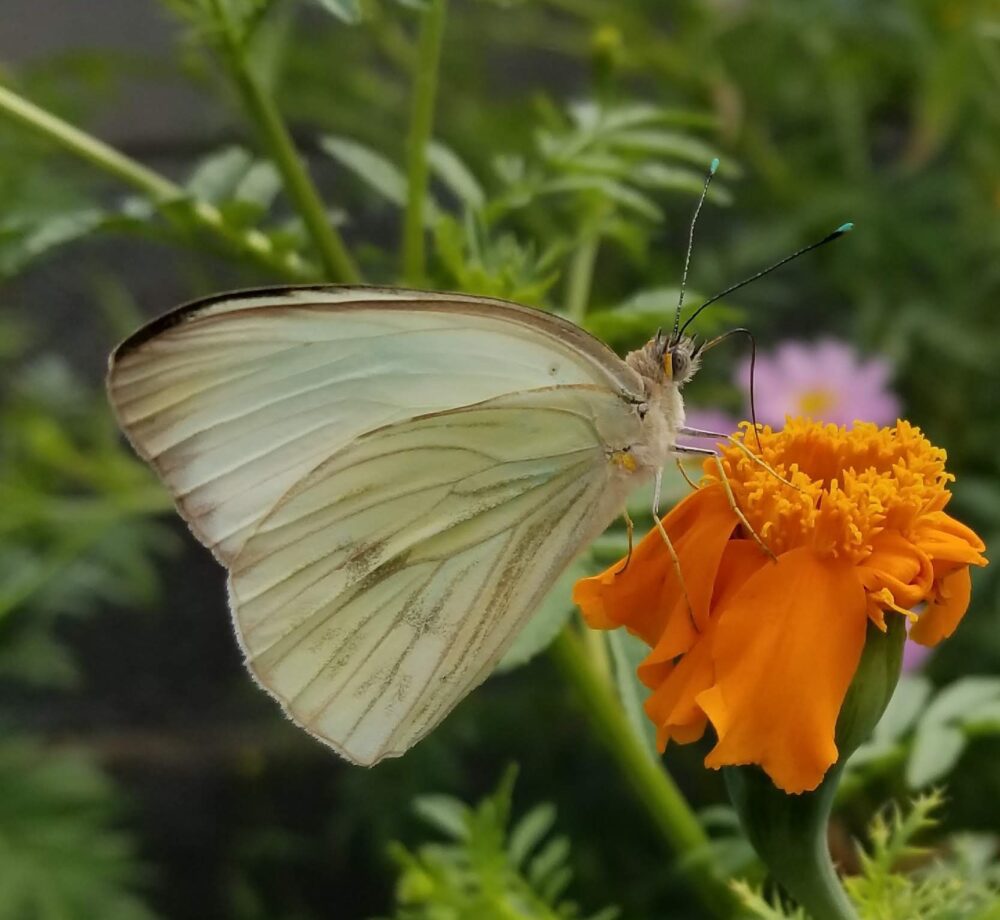October 2021
By Steven J. Cary
I confess to being a bit winded after my adrenaline-fueled mid-September adventures in southern New Mexico. Exhaustion is a familiar feeling for me at this time of year. All summer long I am at full attention, going full bore, as I try to maximize my own personal observations while fielding ID requests and BAMONA submittals from so many friends and colleagues, as well as minding the home front: house projects, vegetable gardens, and family travel. All good stuff, but the wind leaves my sails as summer evaporates. Marcy can tell you . . .
Back in Santa Fe now, days are rapidly shortening, temperatures are cooling, landscape plants and vegetables are senescing. And butterfly life seems more normal, which at this time of year here means we’re largely back to the winter hibernators, which I highlighted last time, and a few of the most common, widespread species that just keep going until cold weather shuts them down. And I hope that will be soon because, well, just because. We need a decent winter.
Of course, southern New Mexico is still producing butterflies where moisture remains. Here are some juicy examples. Judy Yellon found Pygmy Blues to be thriving in the Las Cruces area.

In Grant County, multiple observers have reported a good crop of Apache Skippers (Hesperia woodgatei), a fun regional endemic. Elaine Halbedel crowed about the abundance of Nokomis Fritillary (Argynnis nokomis nitocris) in the Pinos Altos Mountains. Christopher Rustay extended that area’s “sulphurous” summer with his photo-capture of Orange-Barred Sulphur (Phoebis philea) below. This was a blessed relief of sorts from the recent summer blizzards of the more routine sulphurs. And look at what good condition it is in . . . hardly a scale is out of place and the scalloped margin seems fully intact.


Meg Freyermuth of Las Cruces photographed yet another Great Southern White siphoning nectar from marigolds in her backyard. That’s the second one this year, which is two more than had ever been documented in New Mexico in all of ancient and modern history. That first one was from Las Cruces, too, back in 1973. Then CJ Goin got one about 6 weeks ago, also in Las Cruces. Of course, that’s where the observers are . . .
I truly have spent a lot of blog time blathering about Las Cruces area butterflies and butterflyers this summer. It just worked out that way . . . there was lots of cool stuff to talk about and lots of local folks (some veterans and some new observers) sharing their butterfly stories and taking excellent butterfly pictures. And I suspect that butterflies will continue to be better than normal in that area for a few more weeks, weather permitting.
Maybe next year will be Farmington’s year . . . I think they are overdue!
In Northern New Mexico, the end of summer and the close of this year’s butterfly season was punctuated with sadness in the passing of Marion Stelts. Marion was an accomplished birder, butterflyer, and nature photographer who resided in Los Alamos. Five years ago, Marion was the first to photo-document the Question Mark butterfly in Los Alamos County. His photo below is spectacular: simultaneously sharp and soft, with considerable depth of field.

I did not know Marion well, but he was very well known and much respected by his Los Alamos area colleagues. I did have the pleasure of being in the field with Marion this past May as part of a small group that was searching stands of kinnikinnick for Brown Elfin and Hoary Elfin in the Jemez Mountains. Along with his heavy, professional camera, he shouldered a portable oxygen rig and needed help navigating the terrain, which I was happy to provide. That he persisted so cheerfully despite the evident burdens and obstacles spoke volumes about his undying passion. That the group was patient and encouraging spoke volumes about the high regard in which he was held.

Marion will be dearly missed. Thank you, Rozelle, for your help in preparing this brief tribute.
Finally I want to offer a special nod of gratitude to Rachel Landman, PEEC’s Marketing Manager. Along with her regular duties, Rachel makes my life as a crusty, rookie blogger a piece of cake. She reviews all my draft posts, offers useful suggestions, and re-arranges the graphics in appealing ways because I am too dense and impatient to figure it out for myself. And she does it all cheerfully. Thank you Rachel :^)

We will miss Marion Stelts and thank you for the nice tribute. I knew him very well and he updated us with his fabulous pictures he took regularly from his yard too!
The picture sent by Ramie is really nice addition.
Still I am having hard time to think Marion is not anymore with us! It happened so sudden.
Selvi
Thank you for sharing that, Selvi.
Thank you so much for this (and your previous) blogs. It’s great that so many butterflies are being seen in the southern part of the state. Thank you particularly for your lovely tribute to Marion. I will print it out and take it to show Ramie.
Rozelle
Rozelle, I could not have done it without your help. I’m pleased it came out OK. Steve
Is the dainty sulphur the last one to “go” as winter takes over? We keep seeing them
Sulphurea and whites also are still around as well as admirals
Yes, Chick, they will be the last to go if or when we get real cold. I saw one yesterday at 7000 ft in central AZ!
I find these postings from all over the state very helpful since I am not familar with those other than what is down here around Las Cruces. I am expanding my horizons!
Thanks for doing this!
Marcia! How great to hear from you. and I am pleased that you read and benefit from the blog. mission accomplished!
Steve, I always refer to you as New Mexico’s butterfly expert. And that’s the truth! I am grateful that you share your knowledge about our state’s butterflies in these posts.
Thank you very much.
Rebecca, you are very kind. thank you for posting a comment. that’s what this medium is good for, I think.
/Users/apple/Desktop/IMG_5364.jpeg
I hope this works to send you this monarch photo? Taken at Lenora Curtin on 10/27.
Marcy, no photo came through, though I was very tardy in opening your comment. Please send it to me at sjcary@centurylink.net